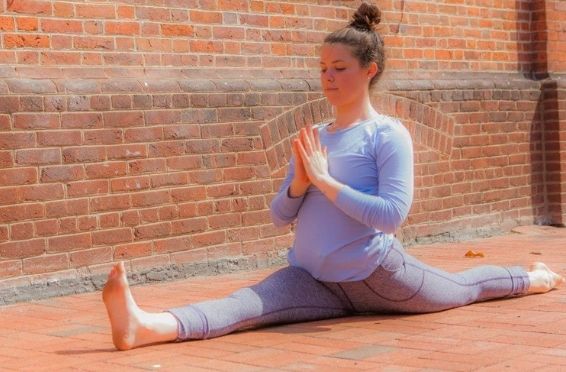Caroline Farrell, LSW, is the Community Outreach Specialist for Innovo Detox. A licensed social worker and a person in long-term recovery, Caroline Farrell is a 200-hour certified yoga instructor who has completed training for yoga in trauma and addiction.
Yoga is used as a healing tool to decrease anxiety, depression, fatigue, insomnia, and physical pain (amongst other ailments and mental health issues) and has been proven to help strengthen an individual’s physical and mental well-being, improve cognitive functioning, and reduce stress. Caroline has seen the benefits of practicing yoga on both a personal level and a professional level. Personally, she has utilized it to help her in her personal recovery journey. Professionally, she has witnessed yoga benefit numerous patients and clients on their journeys of recovery and wellness in a variety of behavioral health care and community settings. In this guest blog for Innovo Detox, she shares how yoga in addiction recovery can offer numerous benefits for individuals.
“Over the last decade, Yoga has become a popular practice for many in the United States. In 2016, the Yoga Alliance conducted a study that stated there are over 36 million American yoga practitioners. But why? What is yoga and why are so many people attracted to the practice? Well, let me tell you a little bit about my journey as a person in recovery, licensed social worker, yoga student, and now a yoga teacher.
At the age of 18, I was exposed to yoga for the first time in a residential treatment center. I do not remember much about my experience but what I do remember is that I hated it. Being in a vulnerable state and new to recovery, it was extremely hard for me to sit still, to be present, and to connect with my body. In fact, it felt impossible at the time in my life and if you would have told me at that time yoga would be a tool that changed my entire life, I would have surely never believed you. But during my journey, a few months after treatment, a friend invited me to a yoga class and I agreed to go. During this stage of my recovery, I was still struggling with regulating my emotions, cravings, and other symptoms of PAWS. I was also struggling with negative body image, disordered eating, and debilitating OCD.
Again, I cannot tell you what I felt leaving that first class with a few months sober, but what I can tell you is that I continued going, and a few months after I developed a consistent practice of movement, breathwork, community, and spirituality, I started to notice a shift. I recognized a shift in my spirit, and I began to feel better about myself, emotionally and physically. I was able to take a pause before reacting. I began to sleep better at night and both my cravings and OCD nearly disappeared. For the first time in my life, I felt at home in my body.
Because of the profound impact yoga has had on my physical, emotional, and spiritual life, I knew I wanted to become a certified yoga teacher and help others adopt the practice. Over the last few years, I’ve received my 200-hour CYT, certification for “Yoga for Trauma and Addiction” through Transformation Yoga Project and my Master’s in Social Work from Bryn Mawr College in Pennsylvania. My education, trainings, and personal experience have allowed me to successfully guide new students in “coming home” to their bodies. Over the past few years of teaching yoga in the community, on college campuses, and utilizing certain aspects of the practice in my clinical work, I have witnessed the same change that I have experienced in many individuals from many different walks of life; many who are on their own personal journeys of recovery.

What is yoga?
The most simplistic explanation is that yoga is an ancient practice that supports the mind body connection through postures and breathwork. The term is derived from a Sanskrit word that means unity. There are many different styles of practice including Ashtanga, Hatha, Vinyasa, Yin and many more that have been developed over the years. The principles (8 limbs) of yoga have many parallels with 12-step and other recovery programs. The “yamas” are “niyamas” are ethical guidelines that support how you interact with those around you, your environment, and yourself.
What are the benefits of yoga?
The benefits of yoga are supported by science and can benefit individuals on their journeys of recovery.
- Yoga can reduce stress and support emotional regulation and overall wellness.
- Yoga can support overall sleep hygiene.
- Yoga can support managing symptoms of depression, anxiety, and other mental health diagnosis.
- Yoga can support in managing chronic pain and other medical concerns.
- Yoga can provide you with a deeper connection to yourself and others around you.
- Yoga can provide structure and commitment in your daily life.
Can I benefit form yoga?
Yes! Anyone can do yoga, there are many different types of practice that may include the physical postures, breath-work, spirituality, etc. I would encourage you to find a teacher you connect with and an environment that provides a feeling of safety and security. Like recovery, yoga is a journey not a destination.”
If you or someone you know needs help for addiction or co-occurring disorders, please give us a call. Innovo Detox offers the latest in evidence-based medical, psychiatric, and clinical care for those in need of detox and medical stabilization in Pennsylvania and the surrounding Mid-Atlantic area. If we aren’t the best fit for you or a loved one, we will take the necessary time to work with you to find a detox, rehab, treatment center or provider that better fits your needs. Please give us a call at (717) 619-3260 or email our team at info@innovodetox.com
Resources:
